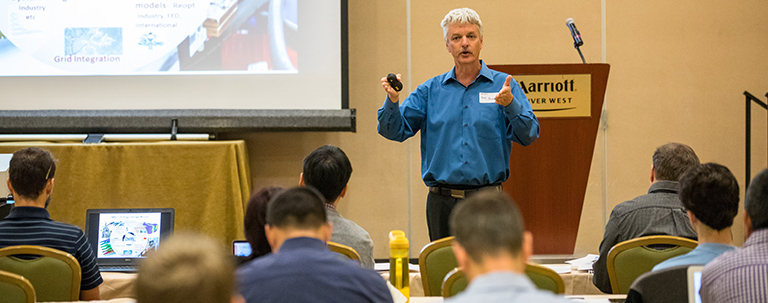Transportation Research Fueled by Academia
University Partnerships and Teaching Positions Keep Researchers Up to Speed

In the rapidly evolving arena of transportation, maintaining robust connections between national research institutions and universities is crucial. That's why the National Renewable Energy Laboratory (NREL) is committed to cultivating a two-way flow of information, expertise, and innovation with the academic community.
NREL has a long, successful history of partnerships with universities including collaborating on transportation research projects, as well as joint appointments and sustaining a host of thriving internship programs. Over the past few years transportation researchers have collaborated with more than 20 universities within the United States and internationally including Carnegie Mellon University, Eindhoven University of Technology (Netherlands), Georgia Tech, Texas A&M, and many more. This encompasses university professors conducting research at NREL, NREL researchers teaching at universities, student interns, and joint projects.
One partnership boasts a quadruple alliance of universities—University of Washington, University of California Davis, University of Kansas, and Texas A&M Transportation Institute—along with the Colorado Energy Office and app developer Metropia Inc. As part of the ARPA-E TRANSNET Connected Traveler project, this group aims to empower individual travelers with information needed to make energy-efficient transportation choices via a personal mobility app.
"The app rewards users for adapting their travel plans, either by shifting departure time, adding passengers, or selecting a route that minimizes energy use and reduces emissions," said NREL's Andy Duvall. "With the recent integration of NREL's Future Automotive Systems Technology Simulator (or FASTSim), the app now shows users personalized energy impacts—not just averages—of route choices and travel departure times."
Another particularly successful partnership involved University College London, along with NASA, the European Synchrotron Radiation Facility, and the UK's National Physical Laboratory. The team studied the mechanisms for rapid and catastrophic failure of lithium-ion batteries, a problem that in extreme cases has been known to trigger overheating in batteries for airplanes, electric vehicles, and cell phones. This work was recognized with a 2017 Engineer Collaborate to Innovate award for identifying safer commercial battery designs for aerospace and automotive applications.
Interested in furthering their research and education with the vast resources available at NREL, university professors come to the lab for joint appointments. Greg Bogin from the Colorado School of Mines is researching cyclic dispersion in engine combustion which includes creating and validating chemical kinetic models to support development of advanced combustion engines with high fuel efficiency and reduced emissions. Greg Rieker and Peter Hamlington from the University of Colorado Boulder are in the process of setting up joint appointments for transportation research at NREL.
Some NREL researchers also choose to immerse themselves in the educational atmospheres of the universities themselves. Transportation researchers who are currently teaching include Senior Research Engineer Adam Duran, who has a senior capstone design course at the Colorado School of Mines, and Matt Thornton, group manager for fuels and combustion science, who teaches a course on transportation, energy, and the environment at the Colorado State University.
"Working with students is refreshing and lets me see the perspective the next generation of researchers will bring to the field," Thornton said. "Hopefully my class stimulates interest and helps students realize their own ability to shape the future of sustainable transportation."
Three more transportation researchers—Yi Hou, Clement Rames, and Josh Sperling—are currently teaching an immersive professional development course in data science through Galvanize, a Denver-based technical education program. Chris Ainscough and Shriram Santhanagopalan also taught thermodynamics at the University of Colorado and Colorado School of Mines, respectively.
Working hand-in-hand with universities builds on the transportation scientists' and engineers' ability to solve complex, real-world problems. These close partnerships also allow researchers to continue their own education and promote the education of fellow and future researchers.
Learn more about opportunities for industry, academia, and government agencies to leverage our transportation research capabilities.
Last Updated May 28, 2025
